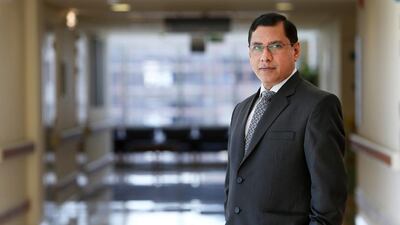ABU DHABI // Doctors, fitness experts and nutritionists say schools and families have to work together to tackle child obesity before the epidemic creates a generation of children who will be outlived by their parents.
“I would really encourage all schools to have simple growth charts for children and they can monitor the weight against the height and age for each child at the beginning of the year,” said Dr Mohammad Chekhali, consultant paediatrician at Healthpoint Hospital, in Zayed Sports City, Abu Dhabi. “This is a very good tool to screen the children, and get obese children to be referred to paediatricians early.”
Childhood obesity, he said, was a problem increasing “day after day”, but early treatment could prevent many diseases that arose from a poor lifestyle, such as cholesterol problems and hyperaemia – issues that many of his patients faced.
Dr Girish Juneja, of Al Zahra Hospital in Dubai, said school nurses should contact parents if they noticed a child’s weight was abnormal and work together to tackle the problem.
Dr Hanan Tosson, of Abu Dhabi’s Al Noor Hospital, said: “There are a number of schools referring but I think every school should be doing it.”
Dr Matlik Matlik, consultant in paediatric neurology at Abu Dhabi’s Burjeel Hospital, saw overweight or obese children “almost on a daily basis”.
The doctor even had parents bringing in their children complaining they were underweight and malnourished when their weight was normal.
The paediatrician believed doctors should visit schools and screen children at risk of being overweight “to break the cycle” of the obesity epidemic.
Sara Primo, a personal trainer specialising in obesity with Advantage Sports UAE, in Abu Dhabi, said physical education should have the same importance as English and maths.
“Exercise should be part of the main role in a child’s development, just like learning how to write, or do maths and logical activities,” she said. “Pre-school morning group walking clubs, extended break times between classes allowing children to play longer and get their heart rate going, after-school sports clubs or partnerships with sports providers, interschool fitness challenges, and school health and wellness days are all options.”
Kieran Francis, partner at Revolution Fitness, said the significance of PE was often undervalued in the school system and parents and caregivers needed to play an equal role in encouraging the belief that exercise is fun.
“Fierce competition revolving around grades has led to too much emphasis on specific academic studies only,” he said. “Parents and caregivers should be encouraging their children to be physically active from a very young age, so that by the time they start school they are already conditioned to play in active ways. That way it won’t feel like a chore but just the norm.”
Carole Holditch, founder of Good Habits, said children who were overweight were much more likely to become overweight adults.
“Perhaps more disturbing, today’s youth may have a shorter life expectancy than their parents because of the high prevalence of obesity,” she said.
“As for school, there are lots of ways to encourage children to be more active. Ban the lift, take the stairs. Issue every child with a pedometer and see who takes the most steps or makes the biggest improvement with exercise-based prizes. These can be fun and addictive.”
newsdesk@thenational.ae

